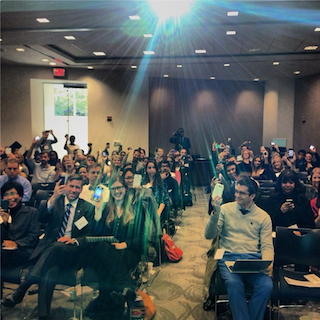Last Friday, the United Nations Foundation and the Digital Diplomacy Coalition hosted “Digital Diplomacy +Social Good,” a half-day conference focused on the transformative power of technology in the evolving conversations about Public Diplomacy in the 21st-century. Dynamic speakers from embassies in Washington, D.C. and international organizations like the UN Development Programme (UNDP), the World Bank, the U.S. Department of State, and the British Council talked about the challenges and opportunities for the tradecrafts of diplomacy and communications in our digital world. Watch the event here.

Follow UN Foundation on Instagram!
In addition to the in-person conversation in Washington, D.C., people from Peru to Morocco added their voices to the dialogue through Livestream, Instagram, Facebook and Twitter. There were several pieces of advice that were consistent throughout the global conversation. Here are the eight key themes about effective online communication that I heard repeated both on-stage and online during the event:
1. Meet people where they are. Diplomats, like all effective communicators when using social media, must use multiple platforms to strategically reach different “digital cultures.” In addition to social and digital channels, leverage the power of offline media and combine with digital efforts.
The politics of platforms: The platform you choose will also choose your audience @MCDapper #DigitalDiplomacy #socialgood
— Plus Social Good (@plus_socialgood) October 25, 2013
2. Listen. Effective engagement occurs through conversation, not propaganda. Don’t simply put out messages, involve your audience. Consistent interaction will build a lasting relationship between you and your constituents.
We need to listen to our media users to engage on issues of interest to them & meet their needs – @usaBritish #DigitalDiplomacy #socialgood
— Layalina Productions (@LayalinaTV) October 25, 2013
Take note: “Everyone should have a twitter account, not to tweet, but to listen” @jimrosenberg #SocialGood #digitaldiplomacy
— Jenny Rabago (@jennylrabago) October 25, 2013
3. Build a networks of networks. A strong community helps to spur conversation and increase engagement online. To build your network faster, and in a more authentic way, work with connected networks of people who care about your issues and can help ensure that you have a 360-degree perspective about what people are saying, how to engage, and what matters to them.
Empower staff to build personal networks, coach on social media, build allies when they leave. @DrDigiPol #digitaldiplomacy #socialgood
— erica burman (@ericaburman) October 25, 2013
4. Tell stories. Data is important, but it is also important to reach people at an emotional level. Create an outlet for authentic storytelling and don’t be afraid to lose some control of the narrative as people add in stories of their own. If it’s an effective story, people will share and make it their own.
Common theme for #DigitalDiplomacy and #socialgood – stories have power. #kelleypd
— Malinda Nafziger (@servetheworld22) October 25, 2013
5. Tell your stories visually. Images and stories can be more powerful than words alone.
.@jimrosenberg People love visualized data nowadays. Simplifies complex info for public consumption #DigitalDiplomacy #socialgood
— Digital Diplomacy (@DigiDiplomats) October 25, 2013
Visual storytelling powerful tool for engagement says @zainyh #digitaldiplomacy http://t.co/TP5q0imbhP
— Ilsevanoverveld (@Ilsevanoverveld) October 25, 2013
6. Be accurate, be authentic. While being fast is important, for an embassy, a news outlet, or a diplomat on her or his personal social media feed, being accurate is essential. An extra set of friendly eyes on your content and data will ensure your digital diplomacy efforts remain credible. While it is key to connect to your audience, never pander – they will appreciate an authentic voice.
It cannot seem like there is a robot behind your feed. Authenticity is key. @zainyh #DigitalDiplomacy @DigiDiplomats
— Molly McCluskey (@MollyEMcCluskey) October 25, 2013
It’s more important to be accurate than quick and wrong in a crisis situation @jamesbarbour #digitaldiplomacy #socialgood
— CIDI (@CIDIoutreach) October 25, 2013
7. Engage your leadership in being active online. Leaders who are personally active in social media create a unique authenticity and set the tone for the whole organization. Some of the best online diplomats are the ones who are part of a top-down and bottom-up culture where social media isn’t a public outreach afterthought, but an integral part of the organization’s communications DNA.
A strong #SocialMedia culture at orgs starts with the leadership. @boazpaldi #DigitalDiplomacy #SocialGood
— Michelle Kulikauskas (@miche4572) October 25, 2013
8. Spur action. Our efforts as communicators are most impactful when they spur specific, relevant action. Design strategies with this goal in mind.
.@boazpaldi: We want some kind of action from people. Always searching for ways to engage, use tools more for #SocialGood #DigitalDiplomacy
— Digital Diplomacy (@DigiDiplomats) October 25, 2013
How do u take digital engagement globally & encourage volunteerism in person & take action 4 #socialgood? #DigitalDiplomacy #MENASocialGood
— المُبادرة العربية (@ArabEmpowerment) October 25, 2013
These themes reminded me that, like diplomacy itself, the techniques and trends around digital diplomacy are changing every day. But the very best efforts in this area are based on some smart public diplomacy basics: be authentic, listen more than you talk, and engage in new and creative ways.
The “Digital Diplomacy +SocialGood” event engaged a global audience in a conversation on online diplomacy. And the dialogue continues. Are you interested in learning more? You can watch the video of the event and continue the conversation with the Digital Diplomacy Coalition and +SocialGood. Tell me what you are thinking and we will share these thoughts with this growing community of people who want to thrive, as diplomats, communicators, partners and global thinkiders, in this new era of digital engagement.
P.S. Check out some of these resources about digital diplomacy:



 View All Blog Posts
View All Blog Posts